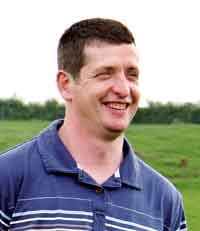FW Awards 2009: Beef Farmer of the Year finalist – David Baillie

A sustainable, profitable future has been difficult for many beef farmers to comprehend in recent years, with rises in cattle prices being largely swallowed up by rises in input costs.
But for profit-focused David Baillie the switch to the SFP system provided the perfect chance to reorganise the suckler herd at Calla Farm, Carnwath, Lanarkshire, which he runs in partnership with his father, also David. “We were running a spring- and autumn-calving herd, but found pneumonia was becoming a big issue for the autumn calves. So, with headage payments removed I decided to change the calving pattern to run a spring-calving herd and a summer-calving herd. This means all calves are 12 weeks old before housing and can be vaccinated against pneumonia.”
With this switch in calving pattern now successfully completed, David is aiming to increase herd size to make it a sustainable enterprise for the future. “The change in calving pattern meant some cows were culled and we have also culled all pre-1996-born cows. This has left us with a 180-cow herd and the intention is to push numbers up to 200 cows.”
Not that this expansion will be undertaken on a whim with stock sourced from wherever they can be found. David is clear about his replacement policy, which relies on sourcing high quality Limouisn cross heifers from his brother’s high health status dairy herd 10 miles away. “We supply him with Limousin semen from the stock bulls for our 30-cow pedigree herd, helping ensure we get the sort of replacement we want.
“Stock bulls for the pedigree herd are selected by eye, with EBVs also a key consideration, and we particularly look at maternal trait EBVs to ensure females bred from them are of a maternal type.”
Health status is also a criterion David looks for when sourcing new bulls and he’s adamant the high health route is the right one to follow to minimise losses. “We’ve suffered with Johne’s in the past, but through testing and culling we’re on top of it now and we vaccinate for both BVD and leptospirosis to help minimise the risk of these diseases.”
Avoidance of excessive risks also dominates David’s sales policy and a strong dialogue is maintained with both live and deadweight outlets to ensure stock are marketed at both their and the market’s optimum time. “I try to sell when demand is high and there is less pressure on prices. And although I normally sell in most months of the year, a large proportion of the stock are sold into the seasonal trade in late November through to early January.
“Deadweight cattle are marketed when they are most likely to earn premium prices due to weight and grade, while liveweight marketing is done after consultation with the auctioneers to ensure there is a demand for the cattle we’re offering.
“On the pedigree side we aim to sell 8-10 bulls a year and I’m particular about the type of bull we sell. They must be correct and of good temperament and to aid buyer confidence we also semen-test all bulls before sale. Any we don’t consider suitable for sale are finished as bull beef and likewise any heifers unsuitable for retention are finished as well.”
While maximising production from the herd is clearly at the top of David’s agenda as recent management changes bed in, he’s also accutely aware of the environment he farms in. The farm has undertaken numerous works through the Countryside Premium Scheme and the Rural Stewardship Scheme. In recent months he has also applied to the Scottish Rural Development Programme and, in a collaborative move with other local producers, he aims to improve the breeding success of waders and also benefit seed-eating birds through a variety of measures.
Looking to the future David sees the coming years as a time of opportunity for the beef industry and indeed his own herd. “The continuing improvement in our herd’s health status along with an increase in numbers will also yield new opportunities for us and I hope in future to move into selling high quality suckler replacements to boost income from the herd.”
Farm facts
- 650ha beef, sheep and arable unit
- Commercial suckler herd with small pedigree Limousin herd
- Live and deadweight selling to maximise returns
- High-health herd key to success
What the judges liked
- “David has an obvious plan for the future of the herd and isn’t scared to take some uncomfortable decisions now for the longer-term benefit of the herd. Herd health status is top of his priorities and changes to herd management based around improving its health are already starting to yield benefit in productivity.”
Three achievements
- Working up the supply chain to maximise cattle values
- Ensures productivity is balanced with environmental needs
- Taken bold decisions on herd structure
- More on the Farmers Weekly Awards
- Meet the finalists
